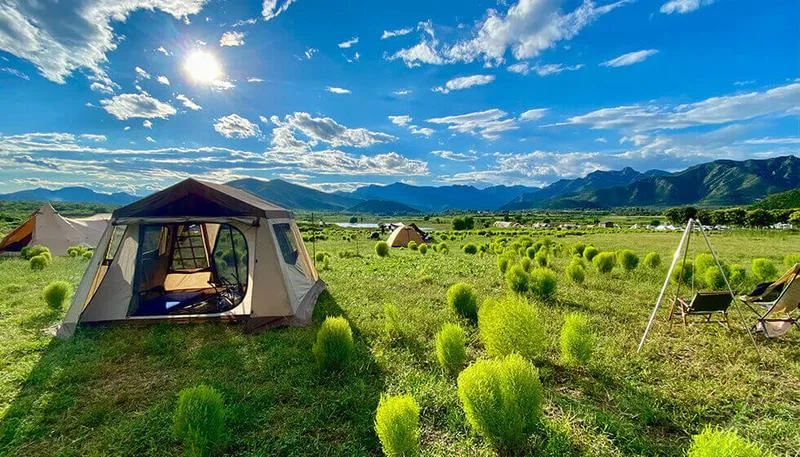Discover essential tips and best locations for hiking and camping for seniors in the USA. Learn how to stay safe, comfortable, and enjoy nature fully with tailored advice and expert recommendations including Pine Cliff Resort.

- Benefits of Hiking and Camping for Seniors
- Essential Considerations for Senior Outdoor Activities
- Recommended Senior-Friendly Hiking Trails and Campgrounds
- Practical Tips for Safe Hiking and Camping
- How Pine Cliff Resort Supports Senior Adventurers
1. Benefits of Hiking and Camping for Seniors
Engaging in hiking and camping for seniors in the USA offers numerous physical, mental, and social benefits. As we age, maintaining an active lifestyle becomes increasingly important, and outdoor activities like these provide a wonderful way to stay fit and connected to nature.
Physically, hiking improves cardiovascular health, strengthens muscles, and enhances balance, which is vital to reducing fall risk. Camping also encourages better sleep patterns and offers opportunities to engage in gentle physical tasks such as setting up camp, which promotes mobility.
Mental health gains are equally significant. The natural environment reduces stress, alleviates symptoms of anxiety or depression, and boosts overall mood. Additionally, hiking and camping foster social interaction, whether with family, friends, or fellow outdoor enthusiasts, combating loneliness which can be common among seniors.
Consider the story of Margaret, a 68-year-old retiree who began exploring senior hiking trails after her doctor recommended more activity to manage arthritis. She found that not only did her joints become more flexible over time, but the scenic views and camaraderie enriched her emotional well-being in ways she hadn’t anticipated.
2. Essential Considerations for Senior Outdoor Activities
When planning hiking and camping for seniors, it’s crucial to tailor activities to individual health conditions and stamina levels. Here are key aspects to consider:
2.1 Health and Mobility Assessment
Before setting out, seniors should consult healthcare professionals to evaluate their cardiovascular health, joint condition, and endurance capacity. Selecting trails and campsites that match one’s physical capabilities helps ensure a positive experience without unnecessary strain.
2.2 Weather and Terrain
Understanding the terrain difficulty and weather patterns is important. Many seniors prefer flat or gently rolling trails with clear markings. Avoiding extreme temperatures and sudden weather changes by checking forecasts ahead of time is also recommended.
2.3 Safety and Emergency Preparedness
Safety is paramount. Carrying a fully charged phone, personal medical information, and first aid supplies can make a critical difference. Traveling with a companion or joining guided senior hikes enhances security and support.
3. Recommended Senior-Friendly Hiking Trails and Campgrounds
The USA boasts numerous destinations ideal for hiking and camping for seniors. These locations combine accessibility, natural beauty, and suitable amenities:
3.1 Easy and Scenic Trails
Places like the C&O Canal Towpath in Maryland offer flat, shaded trails alongside historic canals, perfect for leisurely hikes. Similarly, the John Muir Trail in California has sections that are manageable for seniors, providing breathtaking views of the Sierra Nevada.
3.2 Comfortable Campgrounds
Campgrounds with well-maintained facilities and accessible sites, such as those in Shenandoah National Park, are favored for senior campers. These sites often include picnic tables, flush toilets, and nearby parking to minimize walking distances.
A real-life example is John and Lisa, a retired couple who recently enjoyed a week at a senior-friendly campground. They appreciated the flat walking paths, quiet environment, and proximity to local towns, which offered dining and medical services when needed.
4. Practical Tips for Safe Hiking and Camping
Ensuring safety and enjoyment during hiking and camping for seniors involves thoughtful preparation:
4.1 Gear and Clothing
Wearing comfortable, weather-appropriate clothing and sturdy footwear is essential. Using hiking poles can improve stability on uneven terrain. A lightweight backpack with water, snacks, and sun protection helps maintain energy and hydration.
4.2 Pacing and Rest
Taking frequent breaks and pacing oneself avoids exhaustion. Seniors should listen to their bodies and not hesitate to shorten hikes or modify plans if needed.
4.3 Nutrition and Hydration
Bringing balanced meals and plenty of water is critical. Dehydration can occur quickly outdoors, especially at higher elevations.
4.4 Stay Connected
Keeping communication devices charged and informing someone of your itinerary provide an extra layer of safety.
5. How Pine Cliff Resort Supports Senior Adventurers
Pine Cliff Resort understands the unique needs of seniors who love hiking and camping. The resort offers accessible camping sites equipped with modern amenities designed to maximize comfort and safety.
Moreover, Pine Cliff Resort provides curated hiking routes that suit various fitness levels, ensuring seniors can enjoy nature without overexertion. Their knowledgeable staff offer personalized recommendations and assistance, helping guests discover nearby scenic trails and engaging in activities that promote both wellness and enjoyment.
For seniors seeking a balanced outdoor experience with the perfect blend of adventure and care, Pine Cliff Resort is an excellent choice to plan your next hiking and camping trip.
Barton Park
19009 SE Barton Park Rd, Boring, OR 97009, USA
Visit Location PagePettecote Junction Campground
400 Beach Rd, Cedar Run, PA 17727, USA
Visit Location Page